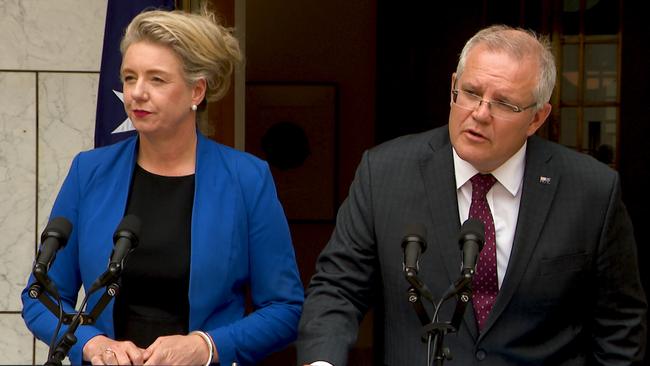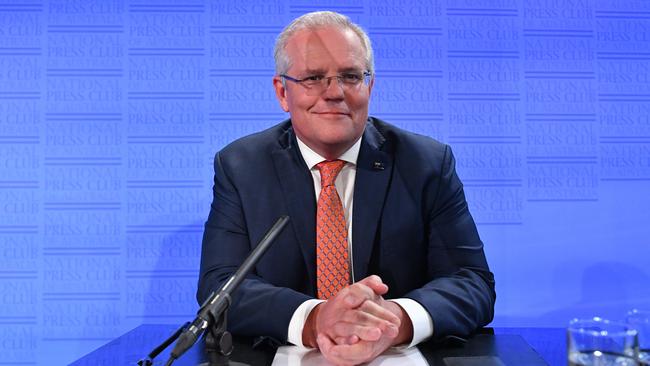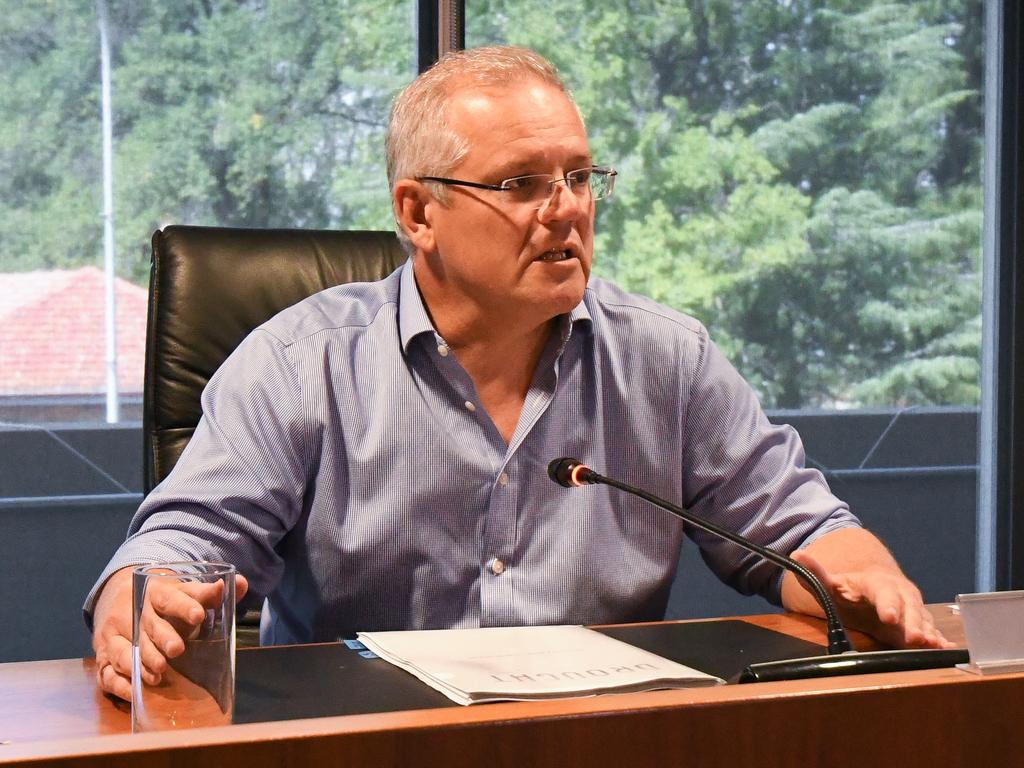Prime Minister Scott Morrison defends current emissions target in National Press Club speech
Scott Morrison defends the Coalition’s target of 26 per cent by 2030 and says he won’t ‘cop’ lectures from Labor.
- Morrison reflects on his fire response
- PM defends current target
- ‘Climate action is happening now’
- Boost to national disaster powers
Scott Morrison is attempting to reset the start of the 2020 political year during an address to the National Press Club in Canberra after a summer of bushfires which have hurt the government’s standing. As well as shifting the Coalition’s posture on climate change, the PM is flagging new powers to allow a “national state of emergency” to be declared in the wake of crises such as the current bushfires.
Richard Ferguson 1.25pm: Budget: insurance for the climate
Scott Morrison says it is in the best interests of maintaining a sustainable budget to prepare for climate change adaptation and resilience, in the same way the government makes strategic investment in defence or national security. “It is taking out insurance for the climate in which we are living. I would come at it from a different perspective and to say it is a wise investment. Two per cent of your economy being invested in defence is a wise investment because it keeps Australia’s strategic interests secure and safe,” he says.
“The investments we put out of our security protection agencies and border agencies is
incredibly important. The cost of not doing so when it comes to those issues falling over, they become significant.
“That is not to say you can prevent the impacts of any and all disasters, of course you can’t. We understand that.
“We need to lay down the longer term investments, whether it is in how technology is being undertaken. We have to ensure that as we continue to live in this climate, we are able to better cope and respond to what comes our way, which makes the Budget more sustainable.
“It is not hit with the bigger impacts of avoidable situations then. I see it very much as part of responsible budget management, of responsible fiscal management and, importantly, part of the national security agenda.”
Richard Ferguson 1.20pm: PM defends sports grant program
Scott Morrison defends the sports grant program administered by embattled Nationals deputy leader Bridget McKenzie, saying it was not meant to funnel money to marginal seats.
The Prime Minister said his own office’s involvement in the scheme was to pass on information that was relayed to them. “Matters are raised with them and that has been done over time to relay those positions onto the relevant ministers in those programs and that is the role that my office played,” he says.
“This is a serious matter, I’m taking it seriously. That’s why we’re acting on the recommendations of the Auditor-General’s report and are and that is — that process is already underway and that’s been implemented.”
Mr Morrison batts back several questions suggesting the program was a “slush fund” or designed to win the government the last election. “(The purpose of the program was to) support local communities in the sporting infrastructure that they need to bond together, to be cohesive and ensure that girls didn’t have to change out the back of the shed,” he says.
“You can have an editorial on it, if you like, you’re welcome to that? That is not why I or the Government did it (political expediency).” Read more about the sports grants affair here

Richard Ferguson 1.15pm: PM reflects on his own performance
Scott Morrison says he is not focused on himself as he is asked at the National Press Club how he has looked back at his own performance during the bushfire crisis. The Prime Minister came under intense scrutiny over a holiday to Hawaii during the peak of the fires, and then the cold reception he received on the ground from bushfire survivors.
“Well, Prime Ministers are never free of character assessments,” he said. “What I tend to do is focus on the task that I need to do each and everyday. What I’m focused on right now is obviously responding to a series of crises, not just when it comes to the issues of the bushfires, which have been so devastating, and the drought.”
Richard Ferguson 1.10pm: PM makes plea for gas supplies
Scott Morrison makes a passionate plea at the National Press Club for gas supplies to be unlocked to help the transition to a cleaner energy future. Resources leaders have been pushing for NSW and Victoria gas supplies to be unlocked, while pushing back on the federal government’s shift towards a domestic gas reservation policy.
Mr Morrison tells the Press Club that gas will help to bridge the gap to renewables.
“We need to get the gas from under our feet. There is no credible energy transition plan for an economy like Australia, in particular, that does not involve the greater use of gas as an important transition fuel,” he says. “There are plenty of other medium or long-term fuel arrangements and prospects, but they will not be commercially scalable available for at least a decade is our advice.
“Gas has a critical role to play, as a back-stop to our record investment in renewable energy generation. It helps ensure we can keep the lights on when the wind isn’t blowing and
the sun isn’t shining.
“Gas can help us bridge the gap while our investments in batteries, hydrogen and pumped hydro energy storage bring these technologies to parity to traditional energy sourcesful right now we got to get the gas.
“Our focus is also squarely on harnessing the power of new technology and allowing natural markets to operate together with the desire and ingenuity of Australians to reduce emissions while keeping the economy strong.”

Richard Ferguson 1.00pm: PM defends current target
Scott Morrison defends his current emissions reduction target of 26 per cent by 2030, and said he will not “cop” lectures from Labor over the use of carryover carbon credits. “Our action, though, is a balanced and responsible emissions reduction plan to reduce emissions by 26 per cent through to 2030 that we took to the Australian people at the last election,” he tells the National Press Club.
“Our target is comparable to countries like Japan, New Zealand and Canada. Especially when account is taken of such factors as our geography, our population density, growth and economic and comparative advantage. It’s a target higher than every other major economy in Asia.
“A target that will see our emissions per capita fall by half. Half!”
The Prime Minister has been under growing pressure to ramp up his emissions reduction policies — from Labor to his predecessor Malcolm Turnbull — following the bushfire crisis.
Mr Morrison tells the National Press Club that it was Labor who signed up to carryover credits — which have come under fire from environmentalists — and said Australia will “meet and beat” targets.
“Our 2030 target is set and we intend to meet it and we intend to beat it. Just as we previously beat our Kyoto 1 and Kyoto 2 targets, when all the critics said we wouldn’t and are saying so again about 2030. And if legitimate carryover credits are not necessary, even better.
“However, let’s not forget on this point — it was the Labor Government that made carryover credits a condition of their signing up to the second commitment period of the Kyoto Protocol. So I’m not copping lectures from that lot.
“We’ll do this consistent with the commitment we gave to the Australian people.”
Richard Ferguson 12.55pm: ‘Climate action now’
Scott Morrison says his government is taking “climate action now” by focusing on policies to tackle the national drought and working on water infrastructure. The Prime Minister tells the National Press Club that the “most ambitious” emissions reduction plans will not stop climate change from happening so action must be taken now to support farmers.
“Building dams, developing new crop, improving plans for natural disasters is climate change now,” he says. “The science tells us the effects of emissions already in the atmosphere will continue to be felt in coming decades, even under the most ambitious global emissions reduction scenarios. Mitigation and adaptation both contribute to resilience.
“Mitigation reduces the risk, adaptation is how we prepare for the climate risk we cannot reduce. We know our farmers are on the frontline of resilience. I saw it first-hand when I was with them only yesterday — continuing to battle this devastating drought.
“In the face of more frequent and severe droughts, they have led the world in the development of drought-resistant crops. That’s climate action now.
“The $5 billion future drought fund will support practical building measures including small-scale water infrastructure and improved information on local climate variability. Sustainable stock management. Soil and water regeneration and the like. Climate action now.”
Richard Ferguson 12.45pm: ‘Hotter, drier summers’
Scott Morrison is outlining his climate change adaptation plan and repeated that hazard reduction must be a key plank of any future resilience to “hotter, drier summers”.
The Prime Minister last week flagged a national standard for hazard reduction and a transparency register for states and territories conducting reduction burns.
“Practical action on mitigation through reduced emissions needs to go hand-in-hand
with practical action on climate resilience and adaptation,” he tells the National Press Club.
“Locally when it comes to practical safety of people living in bushfire zones, hazard reduction is even more important than emissions reduction.
“We need to seriously engage with issues like how we manage negative vegetation, how
we allow landowners to clear asset protection zones or their property ... when and where reduction burns or other practices are carried out.”
Richard Ferguson 12.15pm: PM’s bid to boost national disaster powers
The Prime Minister will focus on the government’s longer-term response to the devastating bushfire season and the future national emergency response plan in his speech. He says he does not want to take over police, fire, ambulance and medical services from the states.
“State fire services have performed with incredible skill and bravery this fire season, saving many lives and homes,” he will say.
“(But) where, when and how the resources and capabilities of the federal government should be engaged is less clear.”
He says the bushfires have tested the limits of how the federal government interacts with the states, which in the past has required a request for assistance from premiers.
In order to clear up issues such as when defence forces can be used, the government will examine three steps:
* Constitutional and legal change allowing the declaration of a national state of emergency and the Commonwealth to take action on its own initiative, including the deployment of the ADF;
* examining the legal interface with the states and territories on responsibilities when it comes to preparation for, and response to, natural disasters and emergencies of national scale; * an enhanced ‘national accountability’ for natural disaster risk management, resilience and preparedness, including setting targets, reporting on key actions and national standards.
Mr Morrison will also repeat his support for a royal commission, which — if backed by the premiers and chief ministers — will have the initial task of auditing previous inquiry recommendations.
Federal parliament will resume next week with a day of reflection on the bushfires scheduled for February 4.







To join the conversation, please log in. Don't have an account? Register
Join the conversation, you are commenting as Logout